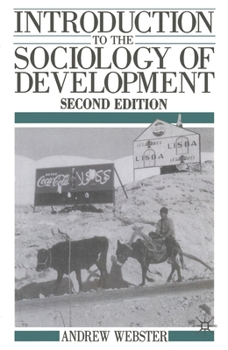Introduction to the Sociology of Development
Select Format
Select Condition 
Book Overview
This text provides a comprehensive introduction to the latest debates in the sociology of development, linking theoretical and empirical issues of social change primarily though not exclusively... This description may be from another edition of this product.
Format:Paperback
Language:English
ISBN:033349508X
ISBN13:9780333495087
Release Date:February 1990
Publisher:Red Globe Press
Length:240 Pages
Weight:0.70 lbs.
Dimensions:0.6" x 5.5" x 8.5"
Customer Reviews
1 rating
Development ideas for the 3rd world
Published by Thriftbooks.com User , 18 years ago
I discovered this book in a book store in Kampala, Uganda. My family and I were in Uganda as volunteers working at a children's center for orphans in the bush 2 hours from Kampala. I arrived in Uganda thinking that all we (the first world) needed to do was to help the local people to grow cash crops and move into a productive, healthy and happy life. I was in Uganda for a little over a year before I purchased this book. In this book Webster explained many of the ideas and thoughts that were churning in my mind as I lived in a 3rd world country and saw the difficulties that the Ugandan people had in making even a subsistence living. I saw the difficulties of cultural differences between the tribes themselves. I was wondering how all these thoughts and experiences could be brought together in a logical manner when I read this small, but powerful book. Andrew Webster says that the solution to poverty is not just more; more money, more big business, more aid and more bureaucracy. But an intelligent approach that considers the cultural dynamics of the community along with the use of economic tools. He pointed out that if a work method or a product is introduced a community that has strong negative cultural implications, the project will fail. Not because the people are lazy or stupid, but because they believed all their lives that such activity was wrong or beneath them or else it violated some community taboo. For instance, if ox plowing is introduced in a community that believes that only the "other" tribe that are herdsmen handle oxen and that the "other" tribe is below their tribe, it will be very difficult to get the local people to try ox plowing. Webster makes the very logical point that successful development must consider the cultural environment in which the development is meant to take place. As Webster talked about the modernization theory, I could see the large tea plantations along the highways in Uganda and I have walked the empty fields where cotton once grew as a cash crop and seen the dilapidated cotton ginnery that was once the pride of a British company long since departed. Webster tells how foreign governments put colonies around the world, not to better the local people, but to generate raw materials for their own industrial machines back home. He echoed what I had been hearing from a local agricultural missionary that was adamant that we should not be training the local farmers to grow cash crops but rather to grow local subsistence crops that can be used by the local community for food if the world price drops for the commodity. After reading this book, I realized that the local farmer can not eat cotton if he can not sell it on the foreign market. That such crops are good for the local farmer only so long as there is a market at reasonable prices for the product. But when that market collapses because the foreign government and corporations are stimulating that product in many other locations and thus a g




